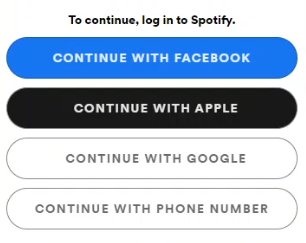OAuth
The OAuth framework facilitates the user authentication process. It authorizes access to the user's data from various services (such as social media platforms, cloud storage, etc.) without requiring users to reveal their login credentials.

OAuth Properties
| Property | Description |
|---|---|
| Disabled [Checkbox] | Deactivates the OAuth widget. |
| Client ID | The unique identifier assigned to your application by the OAuth provider. Note: To obtain a Client ID, you'll need to register your application with the provider. |
| Client Secret | The secret string of characters designated to the Client ID. |
| Scope | A list of permissions that your application requests from the OAuth provider. It determines the actions that your application can perform on behalf of the user. |
| State | A value sent with the OAuth request and returned by the provider in the response. It is used to confirm the request originated from your application. |
| Redirect URL | Users are redirected to this URL after the login authentication. |
| Logout [Checkbox] | Enables "logout" (if available) from the third-party application or service. |
API Methods
setDisabled
Sets the Disabled flag for this component.
- Method
- Usage
setDisabled(visible: boolean): void
// Setting the Disabled to "true" enables the element
a8forms.oAuth("oAuthId").setDisabled(true)
// Setting the Disabled to "false" deactivates the element
a8forms.oAuth("oAuthId").setDisabled(false)
setVisibility
Sets the Visibility flag for this component.
- Method
- Usage
setVisibility(visible: boolean): void
// Setting the visibility to "true" makes the element visible
a8forms.oAuth("oAuthId").setVisibility(true)
// Setting the visibility to "false" makes the element invisible
a8forms.oAuth("oAuthId").setVisibility(false)
setVisibilityCondition
Sets the visibility condition for this component.
- Method
- Usage
setVisibilityCondition(condition: string): void
// Sets a condition for changing the element's visibility status.
a8forms.oAuth("oAuthId").setVisibilityCondition("1 === 1")
Event Handlers
onLogin
onLogin - Sets the OAuth provider's "User Login" URL.
- Spotify
- DigiLocker
async function main(clientId, redirectUri, scope, state, asset) {
// Start of editable area
const url = `https://accounts.spotify.com/authorize?response_type=code&client_id=${clientId}&scope=${scope}&redirect_uri=${redirectUri}&state=${state}`
return url
// End of editable area
}
async function main(clientId, redirectUri, scope, state, asset) {
// Start of editable area
const url = `https://api.digitallocker.gov.in/public/oauth2/1/authorize?client_id=${clientId}&response_type=code&redirect_uri=${redirectUri}&state={unique_identifier}`
return url
// End of editable area
}
onToken
onToken - Generates the "Access Token" with the OAuth provider.
- Spotify
- DigiLocker
async function main(code, clientId, clientSecret, scope, state, redirectUri, asset) {
// Start of editable area
const params: any = {
grant_type: 'client_credentials',
code: code,
redirect_uri: "http://localhost:3000",
client_id: clientId,
client_secret: clientSecret,
}
const formData = new URLSearchParams();
Object.keys(params).forEach((key) => {
formData.append(key, params[key])
})
const response = await fetch('https://accounts.spotify.com/api/token', {
method: 'POST',
body: formData,
headers: {
"Content-Type": 'application/x-www-form-urlencoded',
"Authorization": 'Basic ' + (window.btoa(clientId + ':' + clientSecret))
},
}).then(response => response.json())
.then(data => { return data });;
// End of editable area
}
async function main(code, clientId, clientSecret, scope, state, redirectUri, asset) {
// Start of editable area
const params: any = {
grant_type: 'client_credentials',
code: code,
redirect_uri: "http://localhost:3000",
client_id: clientId,
client_secret: clientSecret,
}
const formData = new URLSearchParams();
Object.keys(params).forEach((key) => {
formData.append(key, params[key])
})
const response = await fetch('https://api.digitallocker.gov.in/public/oauth2/1/token', {
method: 'POST',
body: formData,
headers: {
"Content-Type": 'application/x-www-form-urlencoded',
"Authorization": 'Basic ' + (window.btoa(clientId + ':' + clientSecret))
},
}).then(response => response.json())
.then(data => { return data });;
// End of editable area
}
onLogout
onLogout - Sets the "Logout" URL (revokes user-access) for the OAuth provider.
- Spotify
async function main(clientId, redirectUri, scope, state, asset) {
// Start of editable area
const url = `https://www.spotify.com/logout/`
return url
// End of editable area
}